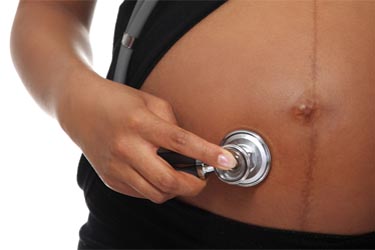How Doulas and Abortion Funds Are Alike: Addressing Gaps in the Medical System, Without Judgement
We are both groups of people that arose to address fundamental gaps in our medical system, and we both provide unconditional and nonjudgmental support for pregnant people.

I’ve always admired the work of abortion funds—always felt that these small acts of resistance and intervention are some of the most powerful things we can do: turning over our own resources so that someone else might get a procedure they need and want. Not long ago I had the opportunity to speak at the Eastern Massachusetts Abortion (EMA) Fund annual fundraiser, which gave me a chance to reflect on what doulas and those who support abortion funds have in common.
First of all, we are both interveners. We are both groups of people who arose to address fundamental gaps in our medical system, shaped by political agendas. Doulas arose in the 1970s to address the isolation and challenge of birth in a hospital setting. Abortion funds arose around the same time to fill gaps left by policies, like the Hyde Amendment and others, that say low-income folks don’t deserve the same access to medical procedures as rich people.
Interveners are a really important part of social justice movements. We’re the stopgap measure working to mitigate the negative impacts of really horrific policies on everyday people. We do many small acts to try and correct the bigger injustices around us. Intervening alone is never the answer, though; it’s just one step on the road to something much bigger.
I’ve heard people say that grassroots funds like the EMA Fund could never raise enough money to meet the needs of all the people who want the abortion procedures they can’t afford. And, in April, I wrote about how we could likely never produce enough doulas to support every person giving birth. But this isn’t just a question of capacity. We, as activists and supporters, actually shouldn’t raise money for everyone who wants an abortion procedure, because those funds should be coming from the health-care plans that already pay for all other medical procedures. And I don’t believe we should have a doula for every birth, abortion, or miscarriage, because our health-care system and its medical providers should provide compassionate, humane, patient-centered care that addresses each patient’s physical and emotional needs.
So while we do this important work as interveners, we also have to work to make sure a day comes when our services are no longer needed. That means fighting the bigger fight to correct our unjust health-care policy, which says low-income folks don’t have the right to abortion procedures. And for doulas, it means working on all sorts of changes to our medical system that will hopefully eliminate the need for us one day. That’s what true social justice work looks like. We deal with short-term needs, we fill the gaps, and we work toward actually building the world we want.
The second thing that doulas and people who support abortion funds have in common is we both provide unconditional and nonjudgmental support for pregnant people.
Whether it’s holding someone’s hand during their procedure, giving them a place to stay when they have to travel far from home, or helping them foot the bill, all of these are acts of solidarity, support, and allyship. For me, being a radical doula has meant acknowledging the systemic injustices that affect all of us, and understanding that those injustices are a crucial part of my work as a doula. That means I recognize how class, race, sexuality and gender, and ability, among other things, all affect people’s experiences with pregnancy and childbirth. Just as the vast majority of people I’ve supported during pregnancy and birth as a doula have been immigrants, people of color, and low-income, that’s also true for many people who support abortion funds.
There are many ways we have of fighting the injustices and inequalities in our world, but I believe one of the simplest and most powerful ways is to provide unconditional and nonjudgmental support. It’s the act of saying, “I’m here for you.” It’s the act of lending a hand, leaving our judgment at the door, and offering help without question for when it’s asked. It’s being a compassionate witness, without patronizing or pitying. It’s being humble, and letting those who are most affected by discrimination and injustice lead the way.
The people we meet in this work, many of ourselves included, are constantly being told they are wrong, that they are to blame, and that who they are and how they live their lives is a problem. Showing solidarity or support can fly in the face of this message, and bring humanity back to a system that constantly strips it away. I’m proud to be in this movement, and I hope the day when none of this is necessary comes more quickly than we imagine.
